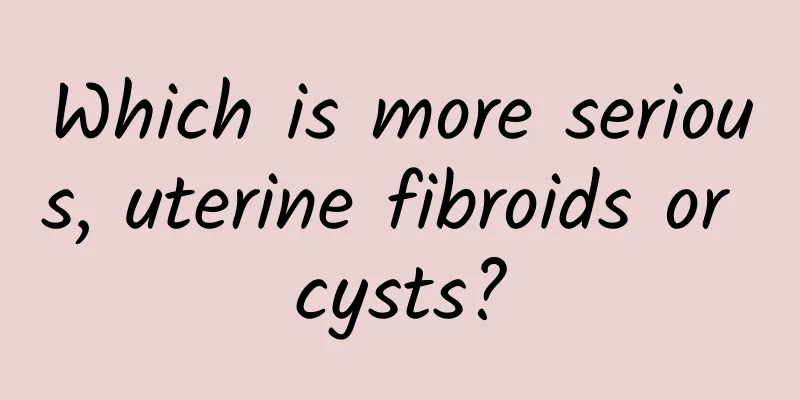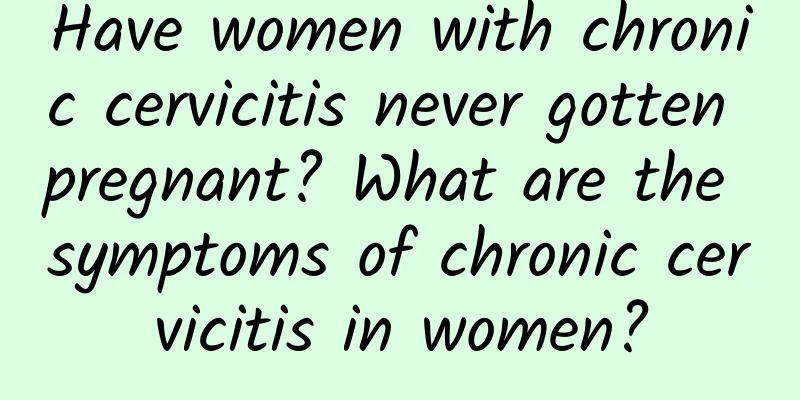Which is more serious, uterine fibroids or cysts?

|
Uterine fibroids and cysts are both benign diseases that usually do not seriously affect health. There is no direct comparison between the two in terms of severity, and timely medical treatment and regular check-ups are key. 1. Basic concepts of uterine fibroids and cysts Uterine fibroids and cysts are two common gynecological diseases. Uterine fibroids are usually caused by increased estrogen levels in the body, while cysts, especially cervical cysts, may be caused by glandular duct blockage caused by cervical injury or inflammation, resulting in the accumulation of secretions. Although the name sounds a bit scary, they are usually benign. 2. Symptoms and treatment methods For uterine fibroids, if the fibroids are small and have no obvious symptoms, usually no treatment is needed, just regular observation. If the fibroids are large or have obvious symptoms, such as heavy menstrual flow or pain, surgical treatment may be required. Cervical cysts are treated similarly. If the cyst is small and asymptomatic, you can choose to observe it. If the cyst is large or is accompanied by unusual symptoms, such as abnormal vaginal discharge, you may need to treat it by puncturing the cyst surgically, which usually works well. 3. The importance of regular inspections Whether it is uterine fibroids or cervical cysts, regular check-ups are very important. Through regular ultrasound examinations, doctors can monitor the progression of the disease and adjust treatment plans in a timely manner if necessary. For most women, regular physical examinations are an effective means of preventing and early detection of gynecological diseases. 4. Influence of lifestyle A healthy lifestyle can also affect the development of uterine fibroids and cysts to a certain extent. Maintaining a good diet, exercising moderately, avoiding obesity, and maintaining mental health may all help prevent and control these diseases. Eating a moderate amount of fiber-rich foods and reducing the intake of high-fat foods may also help regulate hormone levels in the body. 5. Mental health and support As with any health issue, mental health and support systems are equally important. Sharing your concerns with family and friends, or seeking professional counseling, can help reduce anxiety and stress. Maintaining a positive attitude not only helps with coping with illness, but also helps with overall health. Although common, uterine fibroids and cysts are not usually a serious health threat. Most women can effectively manage these health problems with regular checkups, appropriate lifestyle adjustments, and medical intervention when necessary. Remember, any physical discomfort should be promptly consulted to ensure health care. |
<<: I took Fematone for 28 days, but my period still hasn't come.
>>: Can I drink Motherwort Granules during my menstrual period?
Recommend
Do you need to pull the carrots? Nutritionist teaches slimming tips
Many people ask nutritionists how to slim down th...
What are the symptoms of cervicitis in women? 3 things you need to know about the causes of cervicitis
There are many types of gynecological diseases. I...
What causes vaginitis?
Vaginitis may be caused by bacterial infection, f...
What are the symptoms and causes of endometriosis?
I believe that many female friends have heard of ...
The order of diet is very important if you want to lose weight successfully
When it’s time to eat, there’s a table full of de...
How much does Bartholin's gland cyst surgery cost?
Patients with Bartholin's gland cysts are in ...
What is wrong with postmenopausal bleeding? What should I do?
What is wrong with postmenopausal bleeding? What ...
How to treat pelvic effusion? What are the 4 methods to treat pelvic effusion?
Pelvic effusion is an imaging description of flui...
What to do if your ovarian cysts enlarge after your period
What should I do if my ovarian cysts enlarge duri...
How to cure uterine fibroids
Uterine fibroids are the most common benign tumor...
What kind of surgery is needed to check uterine fibroids? What are the methods for checking uterine fibroids?
What kind of surgery is needed to check for uteri...
What are the symptoms of miscarriage? Let's take a look today
Many people do not know much about miscarriage, s...
What is the reason for having menstruation once every two weeks? It is irregular menstruation
Many women will have irregular menstruation. Mens...
How to identify chocolate cysts and what are the hazards of chocolate cysts?
With the increasing pressure of life, more and mo...
"Liver wrapped in oil" special medicine! Weight loss + health management
Fatty liver is not a disease, but it is a health ...









